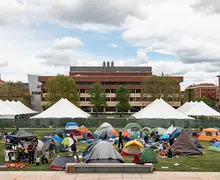Community considers importance of Roe v. Wade, as anniversary approaches
When Judi Rozsa was a student at Syracuse University in the 1970s, some of her sorority sisters and friends became pregnant. But after sudden trips home and out of the country, the girls returned childless.
Abortion was not yet legal, and no one had ever said so, but DeFazio knew the young women had left Syracuse to have abortions. She assumes the girls’ well-to-do families paid legitimate doctors to perform the procedures, but today she’s happy pregnant women who don’t want to give birth aren’t forced to rely on potentially dirty and deadly conditions to have an abortion.
Rozsa’s experiences in college are just one of the reasons why she’s happy Roe v. Wade, the legislation passed by the U.S. Supreme Court that legalized abortion, is celebrating its 30th anniversary this week.
“No one should be out there telling women that they should be forced to have a child they don’t want,” Rozsa said.
But while Rozsa, a clinical social worker and director of Clinical Counseling Services in Syracuse, strongly supports a woman’s right to make decisions about what happens to her body, Sister Pat Larkin and the Catholic church believe in defending the rights of the unborn child inside the mother.
“The church really feels that Christ came for life and we need to respect life, especially the ones who can’t stand up for themselves,” said Larkin, co-chaplain at the Alibrandi Catholic Center at SU. “Someday we’re all going to be older and helpless and if we don’t stand up for these helpless babies now, what hope do we have that others will stand up for us later on?”
Before coming to SU two years ago, Sister Larkin worked as a social worker for 14 years where she often counseled young women who were pregnant and considering abortion. Because the women she saw were members of many different faiths, she was not allowed to advise them for or against abortion. Instead, she educated them about their options, something she said the young women often needed.
“Abortion’s a choice and most the time I feel that most people don’t know it’s a choice,” Larkin said. “When they’re in a position that they feel scared and helpless, they don’t know all the options.”
At Planned Parenthood in Syracuse, Betty DeFazio works with pregnant women daily to help them understand their options. Among these, she said, is giving birth and raising the child, adoption or abortion.
While Planned Parenthood does perform abortions, it also provides other services. In 2001, abortions were the sixth most frequent service provided by the company, preceded by others like contraceptives, pregnancy tests, STD testing and treatments, pap smears and HIV testing and counseling, according to Planned Parenthood of the Rochester/Syracuse Region’s annual report.
Nationally, the number of abortions performed increased after Roe v. Wade was established. However, since 1990, that number has steadily decreased. In 1999 New York led the nation in the number of abortions performed, accounting for 16 percent — or 134,000 — of the United States’ 862,000 legal abortions, according to National Center for Disease Control statistics. Despite this, DeFazio said that abortion has been on the decrease in Onondaga County over the past few years. This she said, is largely because of better education.
“With education and contraception (the number of) unwanted pregnancies go down and that’s what we all want,” DeFazio said.
But SU doctoral student Nora Misiolek said she thinks in some circumstances abortion itself can even serve as an educational tool.
When one of her friends became pregnant while abusing illegal drugs and “hanging out with the wrong crowd,” aborting the child was the right thing for her friend to do to help her get her life back on track, Misiolek said.
“It was a wake-up call for her,” she said. “Thank God she had an abortion. (The child) probably would have had just incredibly bad birth defects.”
Misiolek, president of the Graduate Catholic Community at SU, admitted her views differ from that of Sister Larkin and the Catholic church’s pro-life stance.
“I respect the church’s teaching of ‘Thou shalt not kill,’ but I just think the unilateral position just doesn’t cut it,” Misiolek said. “It ignores that there are circumstances when it’s necessary to make very painful choices.”
Misiolek cited situations when the mother’s health and life might be in danger, or when the pregnancy is the result of a rape, as specific instances when abortion might be appropriate.
If Roe v. Wade were ever reversed, Misiolek said, it would be a mistake.
“I would not want to see that happen,” she said. “It would take away a woman’s choice about what happens to her own body.”
Diane Lyden Murphy, chairwoman of the women’s studies department at SU, agrees.
“Abortion is basic to an empowered life (for women to be able to) make choices over their own bodies,” she said.
Lyden Murphy fears women’s lives would be at risk if the procedure was again made illegal.
“It would be a travesty,” she said. “I think we know from history that we would be moving it back to dark alleys and women would be dying from botched attempts.”
In 1970, when abortion wasn’t yet legal, 15 states liberalized abortion laws and about 135 deaths were recorded as a result of wronged procedures. When it was made legal in 1973, the number of maternal deaths decreased to 73. In 1997, fewer than 10 women died from legal abortion procedures, according to the U.S. Centers for Disease Control and Prevention.
Larkin is aware that when abortion was illegal women found other, less safe ways to have the procedure. She said she doesn’t want abortion to exist, but knows that it’s not necessarily possible to avoid it. For women who do opt to have the procedure, she thinks counseling should be a high priority.
“The people who go through abortion at some point are going to have a lot of emotion for a long time,” she said.
But DeFazio said in her experience as director of external affairs at Planned Parenthood, most women feel relief after having an abortion.
“I know a lot of people think it’s a very difficult decision,” DeFazio said. “It is, but most women really think it through for the best.”
At Clinical Counseling Services, Rozsa said most women look for counseling before they go through with the procedure. Although she’s pro-choice, Rozsa said she doesn’t encourage women to have abortions.
“It’s a very individualized situation,” Rozsa said. “It would be most advisable for everyone considering it to get counseling from someone who’s objective.”
To help ensure her patients receive an objective viewpoint, she asks them to tell her what reasons they have for seriously considering an abortion, adoption or raising the child themselves.
“I don’t tell them what to do ever, but let them work it out themselves,” Rozsa said. “Most of the time they know what they want to do, they just need to air any fears or problems with their conscience.”
Women considering abortion are often concerned that they won’t be able to financially support the child, that giving birth will be too painful to bear, that they won’t be able to finish their own education or that they’ll be defying their church’s religious beliefs, Rozsa said.
In her capacity as co-chaplain, Sister Larkin’s own beliefs caused her to stress the significance of allowing an unwanted child to be born.
“Life is so important,” she said. “There might be less problems in the world if these children lived and reached a great full potential.”
But Rozsa, who said most abortions are performed during the first trimester of pregnancy, doesn’t necessarily see an unborn child as a life.
“I see it as a group of fertilized cells,” Rozsa said. “I do not see that as a human being that can take off on its own.”
Published on January 22, 2003 at 12:00 pm




